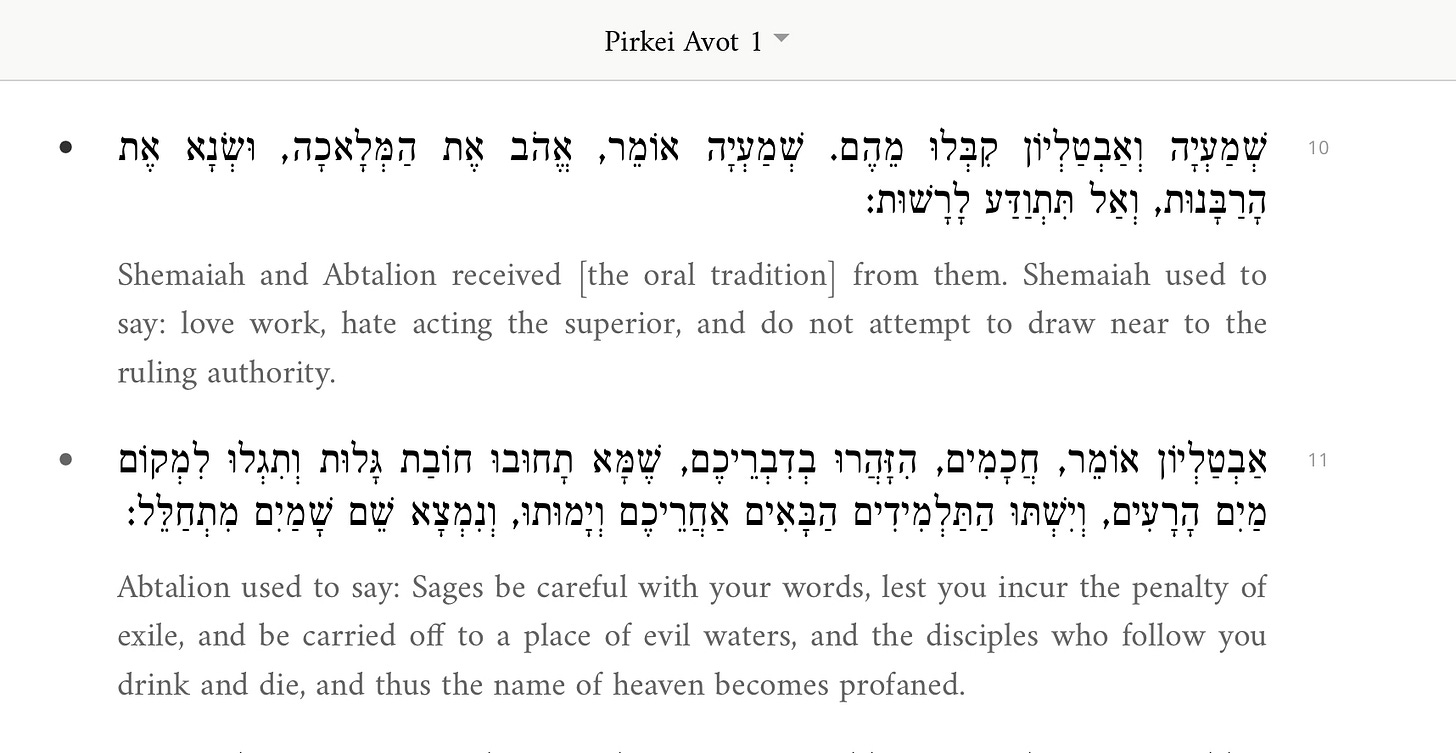The Strongest Sword of All :: Silence
wisdom from the Pirkei Avot and the Step 11 of the Twelve Steps
Reader, I want to talk about silence today. I have come to see silence as the strongest sword we can ever wield against anything we face. It’s sharp. It’s clean. It leaves behind no gruesome carnage. It’s powerful. You can use it on yourself. Silence can have the same healing effect as a surgeon’s scalpel, without the difficult and painful recovery time.
Today was Pirkei Avot1 study group day with my friend Lee Weissman, and in our 45 minute group session we touched on the importance of silence in our faith practise and generally in lifestyle choice. I’ll share some verses that stand out for me regarding silence.
line 10:: love work, hate acting the superior
line 11:: be careful with your words, lest you incur the penalty of exile, and be carried off to a place of evil waters
line 16:: speak little, but do much
line 17 :: I have found nothing better for a person than silence … whoever indulges in too many words brings about sin
When Lee mentioned the importance of silence, as mentioned in line 17, my mind instantly went to Step 11 of the Twelve Steps, Seeking through prayer & meditation to improve our contact with G-d.
Nearly 15 years ago when I was in a 12 twelve step recovery program for cocaine addiction, my Step 11 entailed spending the day in silent contemplation, away from group activities (except for the obligatory nightly A.A. meeting), and in silence. I spent the day in my room, meditating and quietly studying and communing with and listening for g-d. I ate my meals, all communal, in silence.
In retrospect, I’m not convinced that, at this time of my life, I fully appreciated the sacredness, importance, and spiritual value of silent contemplation as a remedial practise, or as an important part of a spiritual routine. When I look back at my time in that residential recovery programme, I remember that too many words did invite trouble, and I remember the immense struggle of fighting the too many words compulsion, and I remember the harm and poisonous drama that too many words conjured up. Gossip, for instance. Also, compulsion to fill every silence with verbiage.
I grew up with a dad who didn’t say much. The silences between my dad and me felt powerful, had a loudness to them. They felt so full of meaning and connection — more so than any words could have done. Silence adds value to spoken words.
Several years ago I read a futuristic dystopian fiction story about a society in which words had a cost and everyone had a balance and each time a person used words they received a deduction from their balance. When their balance reached zero they couldn’t use words — no speaking, no writing.
What if we lived in a culture where words didn’t come so cheaply? What if we respected to price of words? Social media culture makes it a challenge to say nothing, doesn’t it? How many times have you felt the need or even the entitlement to respond when you didn’t need to do and when your words would have no impact on the outcome? How many times have you rushed ahead to contributed your verbal diarrhea to the discourse anyway? What if we could stop ourselves from dispensing cheap and meaningless verbiage to the social terrain? What if we could pause and consider the three things, is it necessary, is it true, is it kind? What if we could pause and wait for some period of time—a few minutes, an hour, a day, a week—prior to allowing ourselves to add more words to the situation?
Words carry weight. We cannot unsay them. We cannot take the words back, once we have said or sent them, once they have left our brains and passed through our lips or taken shape on the paper or screen, once we have pressed the send button. Words that leave our thoughts and become formed in the world exist forever. Reader, it’s all a bit like the story of Pandora’s Box, isn’t it? In Biblical the story of creation, g-d spoke the universe into being. G-d spoke all of creation into being. G-d created humans in His/Her image, gave us the capacity for speech so that we may continue the creative process which S/he began. Through words we engage in creation.
So, reader, what if we tried wielding the sword of silence, on ourselves and on others, when we feel the urge to succumb to the temptation of too many words? Words can become weapons, they can become ballistic missiles, they leave shrapnel when they land on their target. The cleanup of too many words can be enormous, difficult, messy, and often impossible. Too many words often leaves us swimming in a sea of guilt.
Where too many words adds to the carnage and chaos suffered by humanity, silence spares us further suffering.
“Silence is only frightening to people who are compulsively verbalizing.”
― William S. Burroughs
About the Pirkei Avot, from Sefaria;
Composed: Talmudic Israel (c. 190 - c.230 CE)
Pirkei Avot (literally "Chapters of the Fathers," also known as "Ethics of our Fathers") is a tractate in Seder Nezikin ("Order of Damages") and the only tractate in the Mishnah with almost no laws, consisting instead of short statements of advice, ethics, and wisdom. The first chapter outlines the stages of the transmission of the Oral Torah, beginning with Moses at Mount Sinai and continuing through the prophets and sages. The next four chapters contain statements of rabbinic sages, largely in chronological order. The last chapter, not included in the original version of the Mishnah, focuses on the merits of Torah study.







This is so good! Thanks for sharing!
I love the idea of the book about how words have a cost.